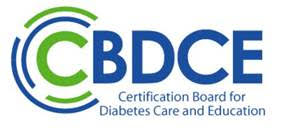Statement of Licensure
Statement of Licensure of Diabetes Educators
The Certification Board for Diabetes Care and Education (CBDCE) believes
That the provision of diabetes education should be vested in health professionals who have fulfilled requirements for CBDCE certification as Certified Diabetes Care and Education Specialists (CDCES). Furthermore, CBDCE believes that a state which, in its wisdom, has determined a diabetes educator or care and education specialist licensure (or registration) law is necessary to protect the health and welfare of its citizens, should also embody similar requirements.
Therefore, should such licensure initiatives be undertaken by a state, the CBDCE will advocate that the law address the following points:
Should state legislative bodies consider licensure of diabetes educators or care and education specialists, CBDCE will advocate on behalf of CDCESs that any proposed legislation reflect the aspects outlined above. Advocacy efforts may include non-financial support such as written and/or verbal testimony given before state legislative bodies.
Adopted in April 2011. Revised in October 2017 and also in May 2020 to reflect the change of the specialty, organization name and credential title.
Therefore, should such licensure initiatives be undertaken by a state, the CBDCE will advocate that the law address the following points:
- A licensed health professional, providing diabetes education within his/her licensed scope of practice, may optionally obtain licensure as a diabetes educator or care and education specialist but would not be required to do so.
- An applicant that holds a CDCES certification, in good standing, would automatically qualify for licensure.
- Educational requirements for non-licensed or non-certified applicants should include completion of diabetes education program(s) sponsored by any advanced academic or continuing education organization that meets state determined standards.
- All non-licensed or non-certified applicants should be required to successfully pass a psychometrically valid competency assessment examination.
- States should consider using existing voluntary certification processes, including administration of eligibility and psychometrically valid examination requirements, as the basis for issuing licenses.
- “Grandfathering” of current diabetes educators or care and education specialists may be necessary. However, such provisions should be time-limited.
Should state legislative bodies consider licensure of diabetes educators or care and education specialists, CBDCE will advocate on behalf of CDCESs that any proposed legislation reflect the aspects outlined above. Advocacy efforts may include non-financial support such as written and/or verbal testimony given before state legislative bodies.
Adopted in April 2011. Revised in October 2017 and also in May 2020 to reflect the change of the specialty, organization name and credential title.
